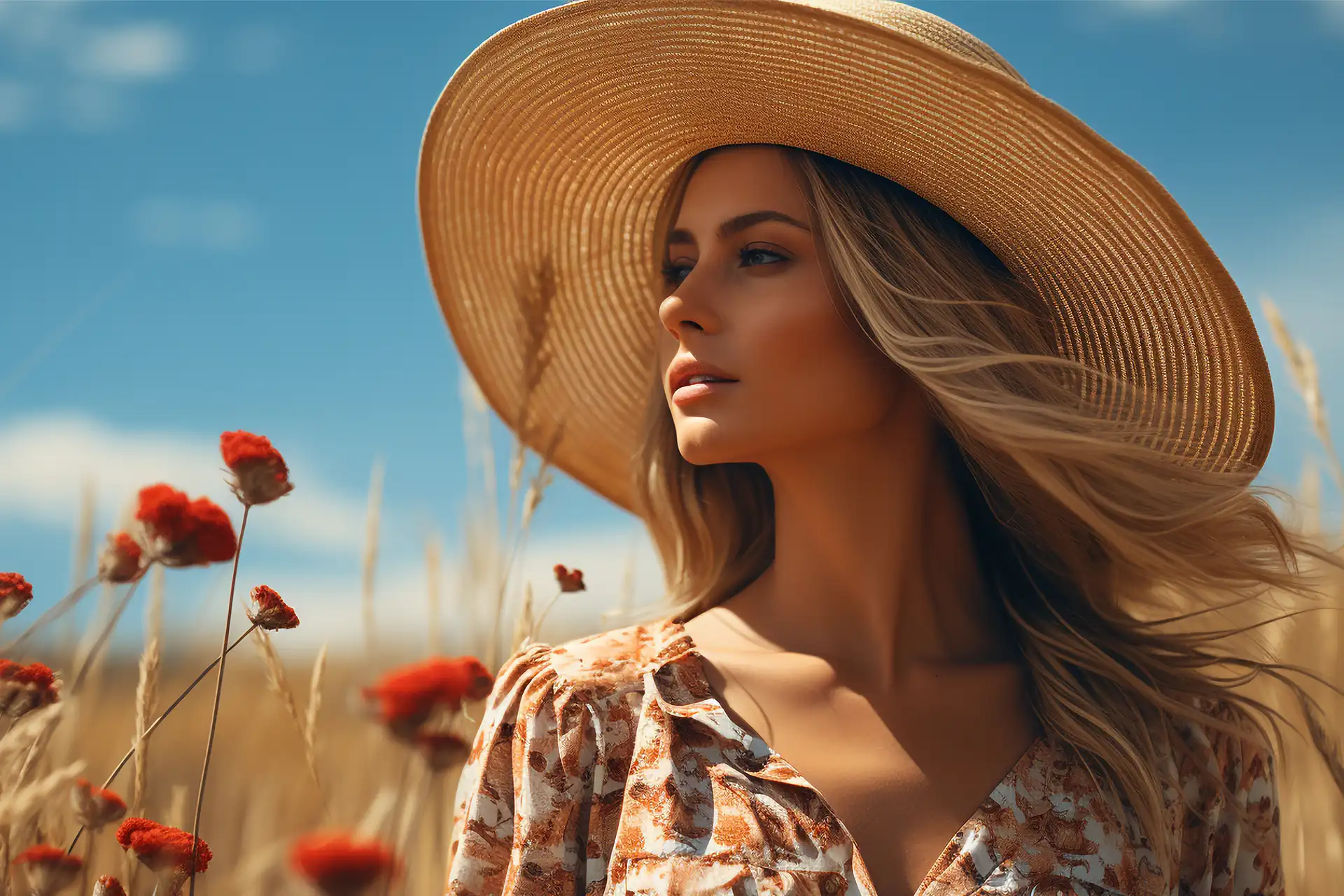The weather in Egypt is always sunny. Of course, there are cloudy days, there are even, believe it or not, showers. But those who visit the resort towns cannot always get caught in the rain. But the sun will get you everywhere and always! This pleases, especially in autumn and winter, when there is a depressing dark November in the homeland, then a cold December, a frosty January, followed by a windy snowy February. And it’s always summer in Hurghada! In summer – hot summer, in winter – cool summer! Egypt attracts both lovers of the antiquities and people who simply miss the sun and the fabulously beautiful sea.
The sun is very important in human life. Sunlight helps the body produce vitamin D, which is essential for the absorption of calcium, which in turn keeps bones strong and prevents osteoporosis. Ultraviolet rays are useful for immunity, in the treatment of rickets and skin diseases. With a lack of sunny days, you are more prone to depression and a bad mood.
Vacationers in the summer know that you cannot stay under the scorching sun for a long time, it is advisable to hide in the shade of an umbrella or hat. But vacationers in winter often neglect protection, believing that the sun is not so powerful in winter. And they are wrong. In Egypt, due to its proximity to the equator, the sun is always strong.
What is ultraviolet radiation and how does it affect health?
The intensity of UV radiation is influenced by a number of factors:
- The height of the sun above the horizon. The higher the sun above the horizon, the stronger the radiation level. The highest levels occur around noon, with approximately 60% of the radiation occurring between 11:00 and 15:00 local time.
- Proximity to the equator. The closer to the equator, the higher the UV radiation. Do not forget that Egypt is much closer to the equator than the northern regions of Eurasia.
- The absence of clouds. When the sky is cloudless, the level of radiation is higher, but even with some cloud cover, the radiation can also be quite strong due to reflection from the clouds.
- Ozone layer of the Earth. It absorbs some of the radiation. The concentration of ozone in the atmosphere fluctuates both during the day and throughout the year.
 Reflection from the Earth’s surface. UV radiation reflects differently on different surfaces. For example, snow reflects up to 80%, dry sand about 15%. People in the shade receive 2 times less UV radiation than those in the sun.
Reflection from the Earth’s surface. UV radiation reflects differently on different surfaces. For example, snow reflects up to 80%, dry sand about 15%. People in the shade receive 2 times less UV radiation than those in the sun.
Small doses of ultraviolet radiation are beneficial to health and are even used in the treatment of certain diseases such as rickets, psoriasis and eczema. For a long time it was believed that sunbathing is beneficial. However, it is not. Excessive exposure to the sun damages the skin and increases the risk of cancer.
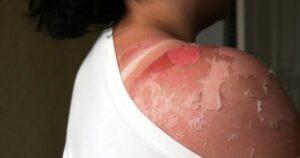 Prolonged exposure to solar radiation can cause acute and chronic damage to the eyes and immune system. Sunburn and tanning are the most well-known factors of skin damage from UV radiation. Subsequently, this leads to cell destruction, vascular damage and premature ageing of the skin.
Prolonged exposure to solar radiation can cause acute and chronic damage to the eyes and immune system. Sunburn and tanning are the most well-known factors of skin damage from UV radiation. Subsequently, this leads to cell destruction, vascular damage and premature ageing of the skin.
WHO classifies solar radiation as a factor with proven carcinogenic properties.
What to do? I want to be beautiful, tanned, but even more so I want to stay healthy.
UV Protection Measures
- First of all, protect young children from direct sunlight. Children should be in the shade while outdoors.
- Sunbathe at safe times, before 10.00 and after 16.00. By the way, the tan obtained at this time lasts longer.Limit sunbathing, starting with 15 minutes and gradually increasing the duration. About one hour a day is enough to get a beautiful tan, avoiding undesirable consequences. The fact is, the sun’s rays accelerate the formation of free radicals, which provoke skin ageing. The body needs time to build up melanin and antioxidants to protect the skin.
- Use light cotton fabrics and hats for sun protection. Especially protect pigmented areas of the skin and moles from sun exposure.
- Use sunglasses that are labelled to block UV rays (UV protection).

- Use sunscreen that prevents skin burns.
Did you know that there are natural oils with proven sun protection? Now we will tell you about them.
First of all it is:
Carrot seed oil
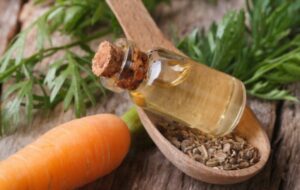 It is the best of natural remedies. Did you know that carrot seed oil has SPF 40? It is a very effective sunscreen, moreover, it is natural and does not contain substances harmful to the skin. Applying this oil to the skin enhances the production of melanin, resulting in a beautifully tanned skin. When taken internally, carotenoids such as beta-carotene found in carrot seed oil provide additional protection from UV radiation. These compounds penetrate the skin after ingestion of the oil.
It is the best of natural remedies. Did you know that carrot seed oil has SPF 40? It is a very effective sunscreen, moreover, it is natural and does not contain substances harmful to the skin. Applying this oil to the skin enhances the production of melanin, resulting in a beautifully tanned skin. When taken internally, carotenoids such as beta-carotene found in carrot seed oil provide additional protection from UV radiation. These compounds penetrate the skin after ingestion of the oil.
Due to the high content of vitamin A, it is not recommended to apply pure carrot seed oil to the skin, so we have invented a wonderful special blend of tanning oils.
Tanning Oil Blend
This mixture, in addition to carrot seed oil, includes the following:
- Jojoba oil
 It has a low sun protection factor of only 4. But this oil is high in vitamin E, an antioxidant that helps neutralise free radicals. Penetrates into the deep layers of the epidermis, enhances the production of collagen and elastin, smooths wrinkles and retains moisture in the skin. This oil prevents premature ageing and reduces the risk of skin cancer. And another important property of jojoba oil is that it improves the absorption of vitamin D under the influence of the sun. This oil can be used undiluted on the face and body.
It has a low sun protection factor of only 4. But this oil is high in vitamin E, an antioxidant that helps neutralise free radicals. Penetrates into the deep layers of the epidermis, enhances the production of collagen and elastin, smooths wrinkles and retains moisture in the skin. This oil prevents premature ageing and reduces the risk of skin cancer. And another important property of jojoba oil is that it improves the absorption of vitamin D under the influence of the sun. This oil can be used undiluted on the face and body.
- Sesame seed oil
The protection factor of sesame seed oil according to various sources is between 2 to 5, but it is often used in sunscreens. It absorbs the sun’s rays, being an excellent UV filter. This oil restores the protective functions of the epidermis, nourishes and moisturises the skin, and prevents oxidation processes.
- Almond oil
Has a protection factor of 5-6. It contains a large amount of vitamin E, an antioxidant that helps keep the skin young and supple. Extremely useful for dry skin, moisturises and prevents it from drying out in the sun.
- Argan oil
Even though argan oil does not have a protective factor, we included it in our tanning oil blend because it contains a high amount of the skin’s most important saviour – linoleic acid, which restores the skin barrier, reduces transdermal moisture loss and provides anti-inflammatory action.
Wheat germ oil
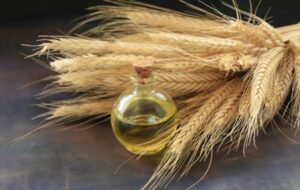 This oil is not part of a tanning oil blend, but can be used on its own. It has SPF 20 and is an effective skin protection product. Wheat germ oil contains vitamin E and antioxidants that promote skin renewal and prevent damage to the skin from UV rays. It also nourishes and moisturises the skin, helps to get rid of fine lines and wrinkles.
This oil is not part of a tanning oil blend, but can be used on its own. It has SPF 20 and is an effective skin protection product. Wheat germ oil contains vitamin E and antioxidants that promote skin renewal and prevent damage to the skin from UV rays. It also nourishes and moisturises the skin, helps to get rid of fine lines and wrinkles.
While enjoying the sea, the sun and good weather, it is necessary to remember not only the pleasant effects of the sun’s rays, but also the consequences that may appear if the sun is abused. Use the above oils for more than just protecting your body. Hair also needs protection. Apply 2-3 drops of oil to your hair to protect it from the effects of the sun and sea water.
If you still couldn’t avoid sunburn, then the best recommended remedy is aloe vera lotion.
Aloe vera lotion
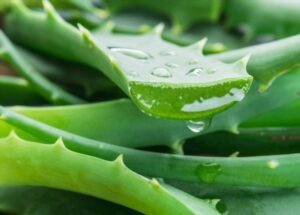 The lotion is uniquely formulated to help protect the skin from UV rays and help relieve the effects of burns. This is due to the content in aloe vera of substances such as acemannan and glycosides, which deeply moisturise the skin and protect it from drying out. Aloe Vera lotion soothes burns, relieves pain, accelerates the healing of minor wounds and scratches, prevents skin flaking from sunburn, and also helps maintain youthful skin and prevents premature ageing by increasing the production of collagen and elastin. The lotion is quickly absorbed and normalises the acid-base balance (pH) of the skin.
The lotion is uniquely formulated to help protect the skin from UV rays and help relieve the effects of burns. This is due to the content in aloe vera of substances such as acemannan and glycosides, which deeply moisturise the skin and protect it from drying out. Aloe Vera lotion soothes burns, relieves pain, accelerates the healing of minor wounds and scratches, prevents skin flaking from sunburn, and also helps maintain youthful skin and prevents premature ageing by increasing the production of collagen and elastin. The lotion is quickly absorbed and normalises the acid-base balance (pH) of the skin.
With prolonged exposure to the sun, another misfortune can happen – a sun allergy. In this case, we recommend using black seed oil.
Black seed oil for allergies
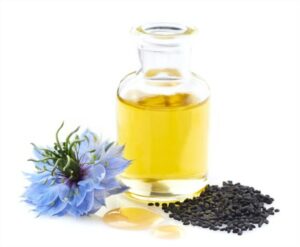 This oil has many indications for health, it helps in the treatment of a huge number of diseases. But we only want to touch on its use for allergies.
This oil has many indications for health, it helps in the treatment of a huge number of diseases. But we only want to touch on its use for allergies.
With the internal intake of black seed oil, complex chemical reactions occur, as a result of which the release of allergic substances is suppressed and the immune system is harmonised.
Long-term use of black seed oil helps the body’s defence mechanism to stop its increased protective defences and restore its natural function, which leads to a reduction or even cessation of diseases associated with allergic reactions. Nigellon, found in black seed, is extremely effective in treating respiratory allergies due to its vasodilating properties and the ability to clear the airways, thereby reducing the injection of histamines into the bloodstream, which prevents an allergic reaction.
In the treatment of allergies, this oil should be evenly applied to the affected area of the skin, and also taken internally with a dose of 1 tsp. morning and evening 15 minutes before meals.
Attention: The internal intake of black seed oil is contraindicated in pregnant women and people with transplanted organs.
Egypt is beautiful at any time of the year! In winter, it has no substitute due to the beautiful warm sea and the sun. We have tried to cover all the problems that may arise with exposure to the sun. We hope that our tips will help you have a great vacation on the beaches of the Red Sea.

